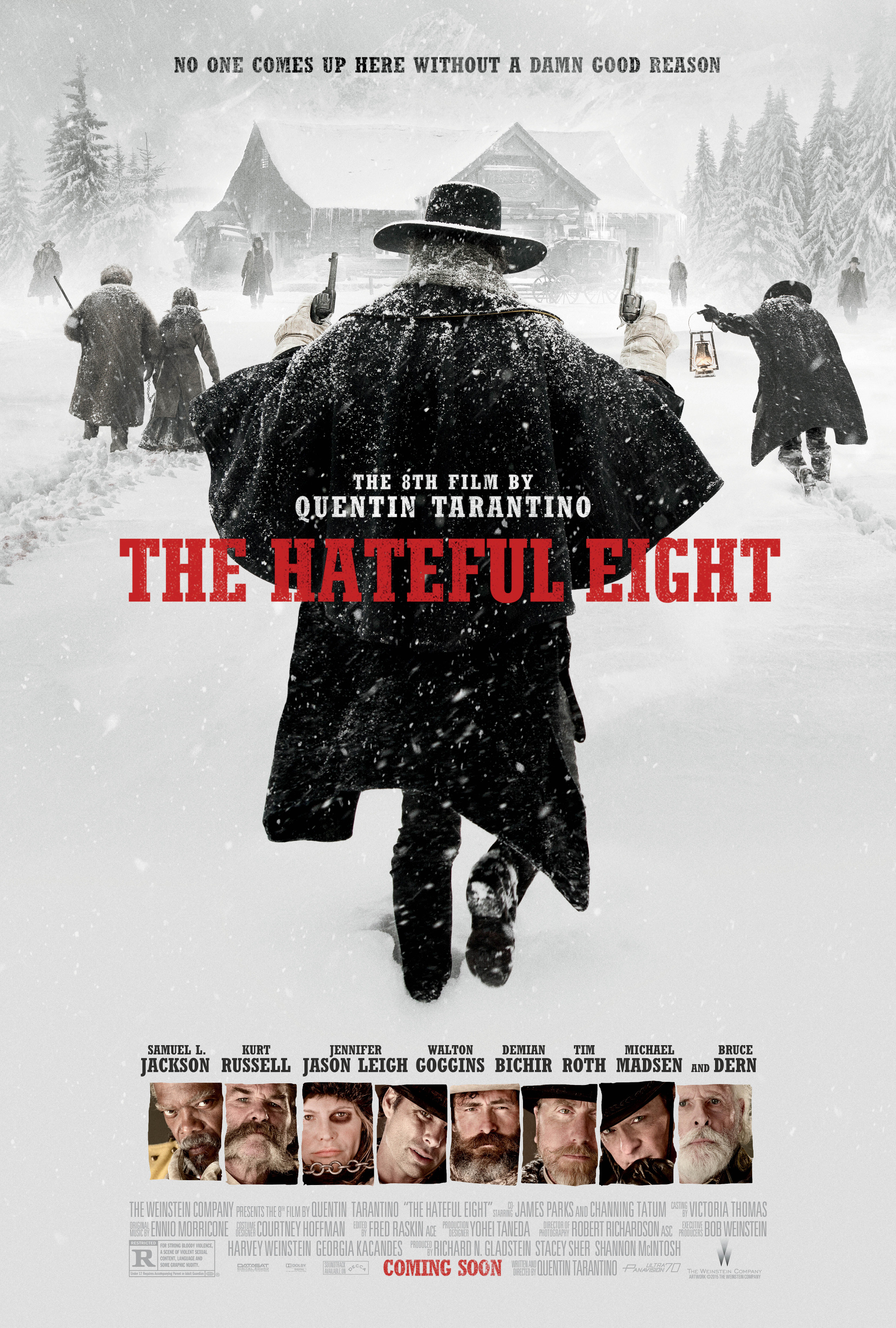Quentin Tarantino’s latest movie has already won or been nominated for awards centered around script, casting and the soundtrack. In Hateful Eight, he has assembled a stellar cast that delivers sharp dialogue in the midst of yet another homage to a classic genre of film – in this case, the Western. Tarantino has a knack for capturing the bleak depravities of the human heart – and make no mistake, this movie plumbs the depth of evil that resides within.
These eight are called hateful for a reason. They are the kind of people who have both received and doled out the kind of violence and wickedness that you pray never crosses your path. Tarantino himself was a little surprised at how the movie played out once he began to film it. He told Entertainment Weekly (“Quentin Tarantino: The Hateful Eight interview”):
“I was realizing when I was watching it about [seven] weeks ago that this could almost be a post-apocalyptic movie, to some degree or another. It’s like this frozen wasteland, and the apocalypse has destroyed every semblance of their society and their way of life, and these survivors are huddled together in this pitiless wasteland shelter. And suddenly they’re all blaming each other for the apocalypse, but the apocalypse is the Civil War.”
I appreciate a story that honestly shows the impact of evil. In fact, I much prefer it to a story that glosses over the ripple effects that follows our actions. There’s a sense in which even his most violent forays function as an morality tale about both the characters in the movies and the response of an audience that either cringes or laughs when the worst of humanity is put on display.The fact that Tarantino can make a movie that elicits revulsion for heinous sins is no small feat in today’s jaded world. I give him props for that.
My problem with Tarantino is that he doesn’t know when to stop. It’s one thing to expose evil; it’s quite another to draw us into a vicarious participation. There is a scene in the movie that will probably define it. Samuel L. Jackson’s character, Warren, seems initially to be the most sympathetic of the Hateful Eight. That’s not saying a lot, but if I had to pick someone to cheer for, it was going to be him. About halfway through the movie, he gloatingly recounts the joyful killing of a man in a remarkably dehumanizing, degrading, tortuous acts of vengeance. He tells this to the man’s father while the camera flips from their conversation to a reenactment of the act in question.
It was a scene both numbing and terrible. In that moment, it becomes clear that he may be the worst of them all. Writing in The Atlantic (“The Hateful Eight Is a Gory Epic in Search of Meaning”), David Sims notes of that scene:
“Warren is handed the film’s worst moment, an absurdly long monologue about the violation and murder of an offscreen character, and just about manages to sell it even though it indulges all of Tarantino’s worst impulses to shock his audience with embarrassingly gross content.”
It was also entirely unnecessary. Just recounting the incident would have been sufficient. But the reveling in it – groveling is probably a better word – breaks down the wall between observation and participation. It’s one thing to remove a wall that separates us from being drawn into nobility, compassion, courage or any other admirable trait. It’s quite another to remove the barriers between the viewers and the apocalypse on the screen.
Tarantino got on the map with Reservoir Dogs and Pulp Fiction (both of which seem to have paved the way for Hateful Eight). In Pulp Fiction, Samuel L. Jackson played a hit man who finds a form of redemption. I don’t know if this movie intends to make a statement with Jackson’s character again, but it ends on an entirely different note. There is no redemption. One of his last acts is to watch a woman strangle by hanging and note how that dance is his favorite one. By this point, nobody was cheering. If Dante had owned a 70mm camera and lived in Colorado, I think the Inferno would have looked something like this.
I walked away from Hateful Eight having absorbed a different message than Tarantino apparently intended. I didn’t get the impression that the Civil War was the apocalypse. It was the ‘pitiless wasteland’ in the hearts of the Hateful Eight. As one audience reviewer noted on Rotten Tomatoes, “These are awful people that say ugly things.”I am reminded of Yeats’ words in “The Second Coming”:
Things fall apart; the centre cannot hold;
Mere anarchy is loosed upon the world,
The blood-dimmed tide is loosed, and everywhere
The ceremony of innocence is drowned;
The best lack all conviction, while the worst
Are full of passionate intensity.
There is an interesting conversation in the middle of the film about justice vs. frontier justice. The Hangman explains to a convict that when she gets to Red Rock, she will be hanged in front of a crowd in the town square by a dispassionate hangman. It’s what civilized societies call justice. However, if the relatives of the person the convict killed were to hang her themselves in the midst of their thirst for revenge, that would be frontier justice.
The implication is that our striving after civilized justice doesn’t matter as much as we think it does. Either way, she dies and somebody cheers. At best, there is a thin line between civilization and chaos. At worst, our moral delineations may just be a useful fiction, a prop holding up Bertrand Russell’s scaffold of unyielding despair.
I appreciate that Tarantino is attempting to warn us of the dangers of ‘destroying every semblance of society’. I just wish it didn’t feel like he was the one loosing the blood-dimmed tide.
____________________________________________________________________________________________________________
The article was originally posted at Empires and Mangers.
